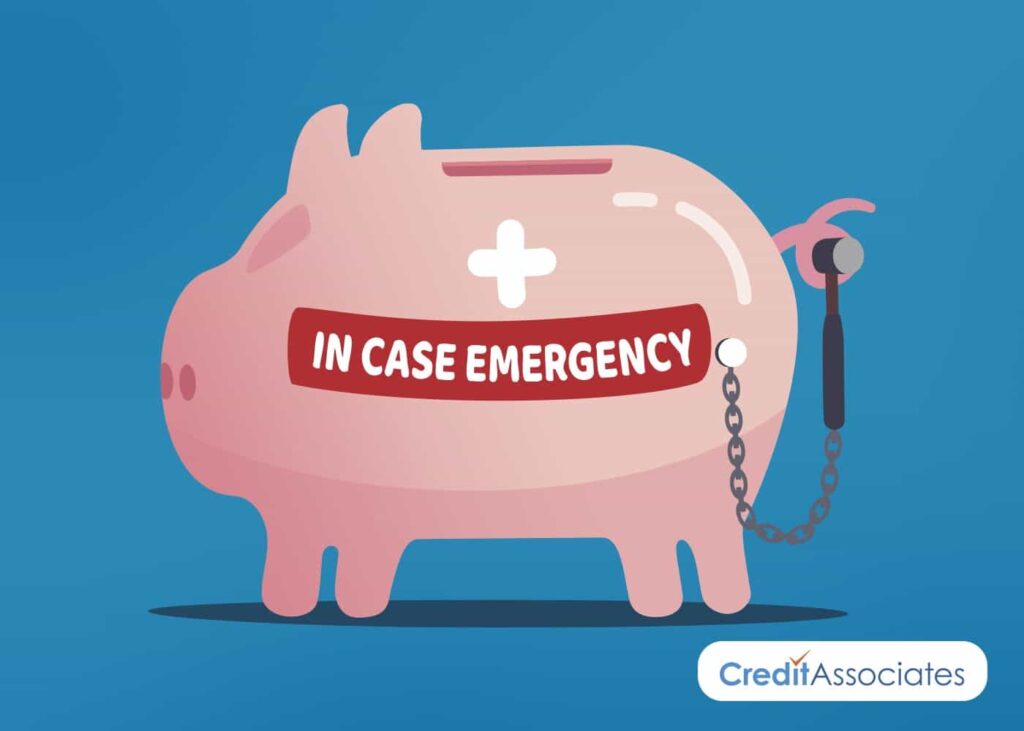An emergency fund can be a true saving grace when life throws an unexpected financial challenge your way. Not having one can lead to a stressful and overwhelming situation, leaving you unable to cover unexpected expenses that often arise—such as a workplace injury, home or car repair, or medical bills.
An emergency fund should be seen as an investment—not just a source of short-term funds— and set up for the long haul. In this blog post, we will discuss the importance of this durable financial safety net and guide how to build and manage your emergency fund.
How to build an emergency fund
Setting realistic goals and budgeting to meet those goals are essential steps to build an emergency fund. Determining how much money you can realistically set aside each month is necessary, and then establishing a timeline for achieving your savings goal. This may mean adjusting your current spending habits, but it’s important to remember that having an emergency fund can provide a much-needed safety net in unexpected situations.
To stay on track, consider setting up automatic transfers to your savings account each pay period and keeping your emergency fund in a separate account to avoid accidentally dipping into it for non-emergencies. Remember, building an emergency fund is a process, but with dedication and discipline, you can create a financial cushion that will give you peace of mind.
Smart strategies to save money for an emergency fund
What smart strategies help you save up for your emergency fund? One option is to cut back on expenses that aren’t necessary. It can be as simple as cutting out your daily coffee shop habit or eating out less frequently. Another strategy is to automate your savings. You can automatically transfer your checking account to a savings account dedicated to your emergency fund. These strategies can build up your emergency fund over time and be prepared for whatever comes your way.
Determining how much to save
One of the best ways to prepare for life’s not-so-great surprises is by having an emergency fund. But how do you determine how much to save? That’s the million-dollar question, and the answer depends on a few factors. First, consider your expenses. How much do you spend on necessities like food, shelter, and utilities? Secondly, think about your lifestyle. Do you enjoy dining out or traveling often? Last, consider your job security and health status. If you have a stable job and good health, you may not need as much saved up as someone who is self-employed or has preexisting health conditions. By considering these factors, you can get a better idea of how much you should aim to save for your emergency fund.
Managing an emergency fund when emergencies arise
When you do hit an unexpected financial challenge, it’s important to have a plan for managing your emergency fund. You’ll first want to assess the situation to determine if an emergency requires immediate action. If so, review your budget to see how much you can safely withdraw from your emergency fund without compromising your financial security. You could look into other resources or government assistance that may be available for the specific issue you’re facing. Finally, remember that an emergency fund is meant to be a short-term solution. After you’ve taken care of the immediate issue, it’s important to focus on replenishing your emergency fund as soon as possible.
CreditAssociates has resources for you
An emergency fund is essential for financial security. CreditAssociates can help individuals budget and plan for their financial goals. With tailored strategies and resources, consumers can create achievable goals and develop a plan to reach them. Visit our website today to get started.
Common questions about emergency funds
How can I build an emergency savings fund from scratch?
The best way to start building an emergency fund is by setting a goal and budgeting how much you can save each month. Consider automating transfers from your checking account each pay period and keeping your emergency fund in a separate account to avoid unnecessary spending.
When should I use my emergency fund?
Your emergency fund should only be used in the event of an actual emergency, such as an unexpected medical bill or job loss. Before withdrawing from your emergency fund, look into other resources or government assistance that may be available for the specific issue you’re facing.
Where should I keep my emergency fund?
Your emergency fund should be kept in a separate account that is not easily accessible. Consider a high-yield savings account or short-term CD to get the most out of your savings.
